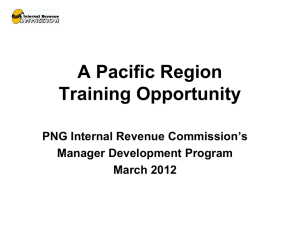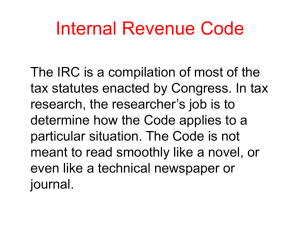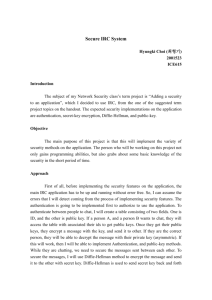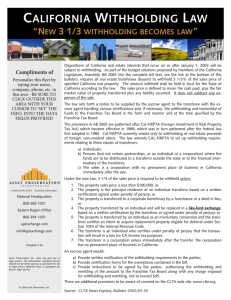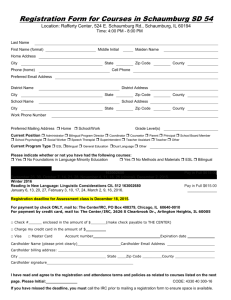TAX CONSIDERATIONS IN REAL ESTATE TRANSACTIONS
advertisement
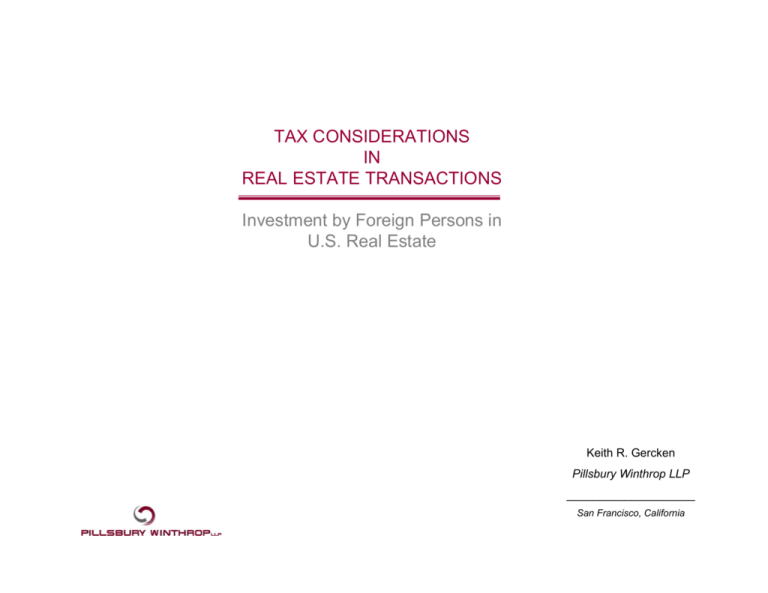
TAX CONSIDERATIONS IN REAL ESTATE TRANSACTIONS Investment by Foreign Persons in U.S. Real Estate Keith R. Gercken Pillsbury Winthrop LLP ____________________ San Francisco, California Overview • U.S. taxation of foreign persons – Portfolio income • Gross withholding tax • Effect of tax treaties • Foreign Investment in U.S. Real Property Tax Act of 1980 (“FIRPTA”) (IRC §§ 871(a), 881, 1441 & 1442) – Business income – Substantive tax liability (IRC § 897) • Net income tax (IRC §§ 871(b) & 882) – Real property income – Withholding obligations (IRC § 1445) • Net income tax (IRC §§ 897 & 1445) 2 Foreign vs. U.S. Persons Nonresident alien: •Green card test (IRC § 7701(b)(1)(A)(i)) •“Substantial presence” in the U.S. (IRC § 7701(b)(1)(A)(ii)) Foreign corporation (IRC § 7701(a)(5), (a)(30)(E)) Foreign estate (IRC § 7701(a)(31)(A)) Foreign trust (IRC § 7701(a)(31)(B)) Foreign partnership (IRC § 7701(a)(5), (a)(30)(B)) 3 Taxation of Current U.S. Business Income U.S. trade or business (IRC § 864(b)) “Effectively connected” income (IRC § 864(c)) Real estate “trade or business” election: (IRC §§ 871(d) & 882(d)) Branch taxes •Branch profits tax (IRC § 884(a)) •Branch interest tax (IRC § 884(f)) 4 Pre-FIRPTA Rules 1 Foreign seller of U.S. real estate was not subject to U.S. income tax on any gain recognized on the sale unless: The foreign seller’s real estate activities were substantial enough to constitute “doing business” in the U.S. 2 The foreign seller had made a “net election” under IRC §§ 871(d) or 882 (d) 3 In the case of an individual, the foreign seller was physically present in the U.S. for 183 days or more in the year of the sale 5 Basic FIRPTA Rules and Concepts Applies Appliestoto dispositions dispositionsof of “United “UnitedStates States real realproperty property interests” interests” (“USRPIs”) (“USRPIs”)by by foreign persons foreign persons Effect Effectisisto totreat treat gain realized gain realizedas as “effectively “effectively connected” connected” income incomesubject subject to toregular regularnet net income tax income tax Significant Significant restrictions restrictionson on otherwise otherwise applicable applicable nonrecognition nonrecognition provisions provisions(e.g. (e.g. IRC IRC§§1031 1031 exchanges) exchanges) FIRPTA FIRPTAtax taxliability liability generally enforced generally enforced through throughaa10% 10% withholding withholding obligation obligationimposed imposedby by IRC § 1445 on the IRC § 1445 on the purchaser purchaseroror transferee transfereeofofaaUSRPI USRPI (Continued on page 7) 6 Basic FIRPTA Rules and Concepts (continued) Will Willnot notaffect affect character characterofofany any recognized gain recognized gain (i.e., (i.e.,capital capitalvs. vs. ordinary ordinary Treatment Treatmentofof losses losses Sourcing Sourcingand and tax taxcredit creditrules rules Tax Taxtreaty treaty override override 7 “United States Real Property Interests” Direct Interests Basic definition Debt carve-out An interest in real property (including an interest in a mine, well, or other natural deposit) located in the U.S. or the Virgin Islands. IRC § 897(c) An interest in property solely as a creditor will not be a USRPI. Types of property included in definition of USRPI: Fee ownership or co-ownership Leasehold interests Time-shares Life estates, remainders and reversionary interests Improvements (e.g., buildings and other permanent structures) Personal property “associated with the use of real property” (e.g. mining equipment, farming machinery, certain construction equipment) Options to acquire land or improvements thereon (even if not currently exercisable), including rights of first refusal Direct or indirect rights to share appreciation of USRPI 8 “United States Real Property Interests” Indirect Interests Certain interests in entities that hold USRPIs are also treated as USRPIs for purposes of FIRPTA As with directly-held interests, an interest in an entity held solely as a creditor will not be classified as a USRPI An interest in a U.S. corporation will be treated as a USRPI if the corporation is classified as a “United States Real property holding corporation” (“USRPHC”) Partnerships, trusts and estates that hold interests in U.S. real estate cannot technically qualify as USRPIs, but the same basic effect is achieved under the IRC § 1445 withholding rules 9 “United States Real Property Holding Corporations” Basic definitional requirements (IRC § 897(c)(2)) 5-year lookback period (IRC § 897(c)(1)(A)(ii)(II) U.S. domestic corporation Presumption is that a U.S. corporation is a USRPHC unless the corporation can demonstrate to the contrary Fair market value of U.S. real property interests is 50% of more of the sum of the fair market value of the corporation’s 9U.S. real property assets, plus 9Non-U.S. real property assets, plus 9Non-real property business assets (wherever located) 10 USRPHCs - Valuation Considerations FMV-based definitional test essentially requires that the corporation have constant appraisals of the relevant classes of its real estate and business assets Special valuation rules apply to certain intangible property (e.g., goodwill and going concern value) (Treas. Regs. § 1.897-1(o)(4)) Alternatively, the corporation may apply the test on the basis of accounting book value (Treas. Regs. § 1.8972(b)(2)(i)) These assets must be valued in accordance with either book value or an actual arm’s length purchase price This tends to depress the valuation that can be assigned to a corporation’s non-real property trade or business assets, and hence makes USRPHC classification more likely However, if this alternative test is used, the value of the corporation’s USRPIs must be 25% or less of the total book value of its U.S. and non-U.S. real property assets and non-real property trade or business assets 11 Exclusions From USRPHC Status Interests in certain U.S. corporations are excluded from USRPHC classification: A corporation that holds no remaining USRPIs if each of the USRPIs that it owned during the 5-year lookback period were disposed of in a fully taxable transaction (IRC § 897(c)(1)(B)) A publicly traded corporation, but only if the relevant shareholder did not own more than 5% of the stock (either directly or indirectly) for the preceding 5 years (IRC § 897(c)(3)) A “domestically-controlled” real estate investment trust (IRC § 897(h)(2) A REIT is considered “domestically controlled” if less than 50% of its stock was owned directly or indirectly by foreign persons within the preceding 5 years 12 Disposition of USRPIs FIRPTA only applies upon a “disposition” of a USRPI “Disposition” is not defined in the statute, but has been broadly interpreted to include the following: Sales and exchanges Capital contributions to a corporation or partnership Corporate or partnership distributions Transfers in connection with a corporate merger Gifts (where the transferred property is subject to liabilities In excess of its adjusted tax basis) 13 FIRPTA Nonrecognition Override FIRPTA will generally apply to create a U.S. tax liability even in the case of dispositions where a nonrecognition provision would otherwise apply, unless: The foreign transferor receives a USRPI in exchange for the transferred USRPI The USRPI received in the exchange, immediately following the exchange, would be subject to U.S. tax upon its deposition; and The foreign transferor complies with certain IRS filing requirements Treas. Regs. § 1.897-6T Certain foreign corporations eligible for benefits under certain U.S. treaties that wish to take advantage of otherwise applicable nonrecognition rules may consider electing to be treated as a U.S. domestic corporation under IRC § 897(i) 14 FIRPTA Withholding – General Rules Basic withholding requirement: 10% of amount realized Requirement to withhold theoretically applies even if the purchaser or transferee is itself a foreign person or entity The “amount realized” on the transfer equals the sum of cash and fair market value of other property received on the transfer plus the outstanding amount of liability assumed by the transferee or to which the USRPI is subject (Treas. Regs. § 1.1445-1(g)(5)) Selling expenses and other similar offsets are not deducted for purposes of determining a transferor’s “amount realized Unless a withholding certificate is obtained from the IRS, a transferee is required to remit the full amount of the withholding to the IRS in cash notwithstanding the fact that there may be insufficient cash immediately payable to the foreign transferor in the transaction Special rules apply to certain foreclosure and repossession sales in which an insufficient amount of cash is due back to the foreign borrower (Treas. Regs. § 1.1445-2(d)(3)) In many cases, the amount withheld will be in excess of the foreign transferor’s actual U.S. income tax liability on the sale. Any such excess can be recovered by the foreign transferor by filing a claim for refund 15 FIRPTA Withholding Overview of Exceptions Withholding generally not required when one of the necessary elements triggering FIRPTA liability is not present: The transferor is not a foreign person The transferor must properly certify, under penalty of perjury, that it is not a foreign person and must provide its taxpayer identification number in order for the transferee to be freed of its withholding obligation (Treas. Regs. § 1.1445-2(b)) The interest transferred is not a USRPI Where stock of a domestic corporation is transferred, the corporation must certify to non-USRPHC status (Treas. Regs. § 1.1445-2(e)) The transfer of the USRPI does not constitute a “disposition” The transferor has no amount realized on the transfer (e.g., a gift) (Continued on page 17) 16 FIRPTA Withholding Overview of Exceptions (continued) The transferee’s withholding obligation may be reduced or avoided under certain other circumstances: The transaction is for the purchase of property for use as a personal residence for $300,000 or less (IRC § 1445(b)(5)) The transfer is eligible for nonrecognition treatment and the transferor provides proper notice to the transferee and the IRS (Treas. Regs. § 1.1445-2(d)(2)) The transfer involves an acquisition by a U.S. governmental body (Treas. Regs. § 1.1445-2(d)(5)) A withholding certificate can be issued by the IRS that either reduces or eliminates the withholding requirement (Treas. Regs. § 1.1445-3) Such a certificate would typically be issued in circumstances where the amount to be withheld would significantly exceed the amount of tax imposed on the foreign transferor as a result of the disposition 17 FIRPTA Withholding Entity Distribution and Transfer Rules U.S. domestic partnerships are required to withhold 35% of the taxable gain recognized on dispositions of a USRPI that is allocable to foreign partners (IRC § 1446; Treas. Regs. § 1.1445-5(c)(1)(ii)) 9 Similar rules are applicable to dispositions of USRPIs by certain U.S. trusts and estates with foreign beneficiaries (Treas. Regs. § 1.1445-5(c)(1)(iii)) Foreign corporations are generally required to withhold 35% of the taxable gain recognized on distribution of a USRPI (without regard to whether the distributee is a foreign or U.S. shareholder) (Treas. Regs. § 1.1445-5(d)) U.S. corporations that are classified as USRPHCs are generally required to withhold 10% of the value of any cash or property distributed to a foreign shareholder (Treas. Regs. § 1.1445-5(e)) 9 This withholding requirement only applies if the distribution is treated under applicable rules as a distribution in redemption of some or all of the shareholder’s stock, or is a distribution in liquidation of the U.S. corporation (Continued on page 19) 18 FIRPTA Withholding Entity Distribution and Transfer Rules (continued) Transfer of interests in partnership: 9 Interests in partnerships that own U.S. real property are not generally considered to be USRPIs 9 Nevertheless, a purchaser or transferee of a partnership interest from a foreign transferor is required to withhold 10% of the amount realized on the transfer if: 50% or more of the gross value of the partnership’s assets consist of USRPIs, and 90% or more of the gross value of its assets consist of USRPIs plus cash and cash equivalents 9 Pending the issuance of regulations by the IRS, no similar rules are currently in place for transfers of interest in foreign trusts and estates (Treas. Regs. § 1.1445-11T(b), (d)(1)) Capital gain dividends distributed by REITs to foreign shareholders are subject to 35% withholding (Treas. Regs. § 1.1445-8(c)(2)) 9 This withholding requirement applies even if the REIT is “domestically controlled” 19 FIRPTA Withholding – Mechanics Amount Amountwithheld withheld must be reported must be reported and andpaid paidover overtoto the theIRS IRSby bythe the th 20 day after 20th day afterthe the transfer date transfer date IRS IRSForm Form8288 8288 (U.S. Withholding (U.S. Withholding Tax TaxReturn Returnfor for Dispositions Dispositionsby by Foreign Persons Foreign Persons ofofU.S. U.S.Real Real Property PropertyInterests Interests “Transfer “Transferdate” date”isis generally generallythe thefirst firstday day on which the on which the transferee transfereepays paysany any consideration or consideration or assumes assumesaaliability liability 20 Keith R. Gercken Tel: 415.983.1808 Fax: 415.983.1200 E-mail: kgercken@pillsburywinthrop.com Keith R. Gercken is a partner with Pillsbury Winthrop LLP, where he focuses his practice in all areas of business income taxation, with emphasis on corporate and partnership taxation and international transactions. He is a member of the firm’s Global Energy, Project Finance, Asset Securitization, Mergers & Acquisitions, Private Equity Funds and Financial Institutions practice teams. Mr.Gercken advises corporate and individual clients on the U.S. federal and international tax consequences on a wide range of transactions, including mergers and acquisitions, tax-free reorganizations, partnerships and joint ventures, the formation and operation of equity funds and REITs, structured finance transactions, tax-free exchanges, international licensing, foreign operations, and inbound investment into the United States by non-U.S. investors. He is the author of a number of articles on international, corporate and partnership issues and has been published in USC Major Tax Planning, Business Law Today and Tax Notes International. Mr. Gercken received his B.A. from University of California at Berkeley and his J.D., magna cum laude, Order of the Coif and Thurston Honor Society, from the University of California, Hastings College of the Law. He is a member of the American Bar Association #10792632_v1 21
